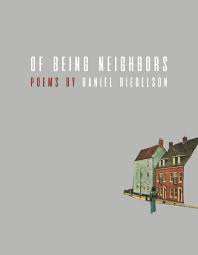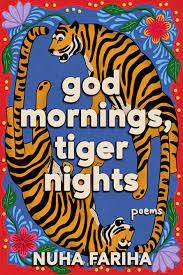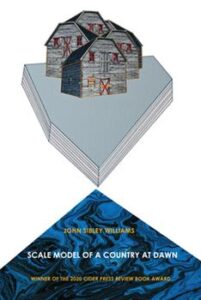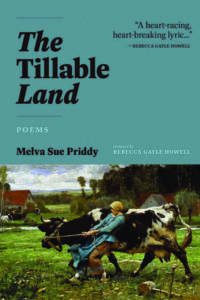Reviewed by Alison Hramiak | September 16, 2022
Ricochet Editions, 2021
Small Press Distribution, $15
At first glance of being neighbors looks like a book that concentrates on what its title suggests –neighborliness. A fleeting glimpse at the contents might have you thinking that it is structured almost like a report with subheadings. Do not be fooled by this. The more you read, the more you realize that it is something much deeper. Yes, neighbors do emerge as a recurrent theme throughout the book, with the poems of the title – all ten of them – being revisited right at the end, having appeared throughout the contents, but this book is so much more than your typical poetry collection. Threaded through the titular topic are other sub-themes of family, love and religion. It is original and creative –from the formatting of its contents to the writing and the poems themselves.
The formatting of the table of contents does not always match that which is used in the book in terms of use of capitals, and the lack of page numbers for sections at the end, however, this may be something that was done on purpose – as a way to keep the reader engaged. If so, I’m not sure that this was necessary – the words of the poems do that for themselves. Grounded reality intertwines with intelligent, sensitive, and innovative metaphors like “Or which body do we occupy. One of mine is a ship whose husk/hull, rusted open, looks like a baying wolf.”
There are some very long titles in this collection, and some very long poems to go with some of them. But they are well worth the time taken to read them from start to finish. The clever use of variable line length, combined with the myriad ideas arranged within the lines, keep you reading to the end. The author has also used quotations throughout the book, and it would be interesting to know why these were chosen and placed where they are.
In the body of the book, many of the poems have quotations and their source highlighted. While some are easy to connect trough from quotation to poem, such as the lines about Cherry on p42, from Sam Cooke, others are less so. Some lines are so short and generic, and it is challenging to work out why they are there, lines such as “You send me” from Sam Cooke on page 19, to long quotations like the one from William Strunk on p 60 about sentences. Independent of the length, however, these quotations represent, for me, a modern and pioneering technique that further engages the reader and asks questions, especially with the shorter, simpler, unspecific ones that could almost come from anyone. Yet they haven’t. They have come from a specific source for a specific reason, and because they stand out from the main text as quotes, we are sent down a path of wondering why these words. Why are these words linked to this person in this poem? For example, why use “each to each” in the line “We know how they grow. This is how we speak ‘each to each'” as a quotation from T. S. Elliott on page 30 in “The Metaphorical Heart”? Such a simple phrase, and yet, when linked to the words of another poet, it feels like it means so much more.
The poems about neighbors sit in that grey area between poetry and prose, and more comfortably in the latter. This might deter some from reading such ‘concentrated’ text because it doesn’t look like more ‘traditional’ poetry. But once you start to read it – and read it aloud – it feels like poetry. Think of it as poetic prose or prosaic poetry – a theme which recurs throughout the book, with many of the poems formatted like this, poems such as “We Carry Ourselves Everywhere” on page 40 which moves straight from the title to the first sentence of the poem seamlessly, and on then to the rest of the ’paragraph’ containing poetry that simultaneously makes you smile (“A chorus of roses”) and reflect (“Next year we must remember to misremember”).
Family, love and religion thread through the collection like a river meandering to the ocean. These themes are written in a way that is both very moving and also gritty, earthy. These are the stand out topics for me, and they seem to pervade all the poems in some way. There are many examples of these threads in the collection, particular lines which stand out for me are “Will you pray with me. Pray with your feet on the pavement. When she was born we didn’t know if she would ever walk. Now she says my whole body is a winter storm as she leaps across the couch upending the cushions” on page 68 from “Notes on The Winter Holidays.”
This is a substantial collection of poems, both in size and in the depth of feeling held within the words. The poems are very personal and tell stories from a life that feels like it has been scarred and yet also loved, and one which is still being loved. The depth crosses generations, from the past to the present, and beyond into the future, one such example being: “When you were younger you stacked stones upon stones. Placed some in your pocket. In easy forgetfulness. Now they are too heavy to take out” from “We Live In An Unknown Sea” on page 16.There is a lot of choice in terms of style, topic and length within the pages, something for everyone here. These poems need and deserve time. Time to read and reread to get the full experience of the metaphor and the message. Time to immerse oneself in the meaning, in the reading and connecting from the page to one’s own experiences of all the topics Biegelson explores, from neighbors to family and religion and back in full circle to neighbors again – embracing the elemental forces of nature along the way.
ABOUT THE AUTHOR
Daniel Biegelson is the author of the book of being neighbors (Ricochet Editions) and the chapbook Only the Borrowed Light (VERSE). He serves as the Director of the Visiting Writers Series at Northwest Missouri State University, where he also works as an editor for The Laurel Review. He serves as the Director of the Visiting Writer Series at Northwest Missouri State University. He holds an MFA from the University of Montana, an MA from the University of Massachusetts–Amherst, hails from New Jersey and lives near Kansas City with his wife and children. Find him at danielbiegelson.com.
ABOUT THE REVIEWER
Alison Hramiak is a part time poet and part time teacher educator living and working in Yorkshire. She has written poems from an early age and has been published in several Forward Poetry anthologies and also on various web sites funded by the Arts Council. She writes for occasions at www.poetryforlives.co.uk and regularly blogs about poetry there. She reviews educational and historical writing, and has recently started performing at open mic sessions including at the Huddersfield Literature Festival earlier this year.





